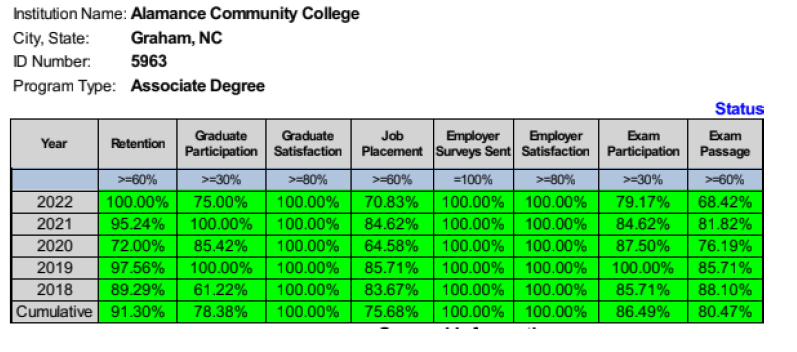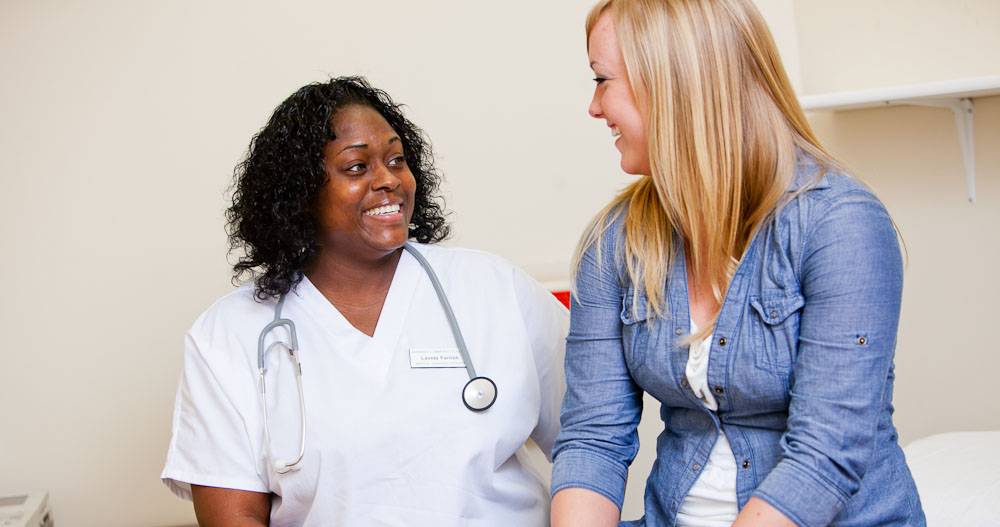Health and Public Services
MEDICAL ASSISTING
ASSOCIATE IN APPLIED SCIENCE | DIPLOMA
Medical assistants are multi-skilled health professionals specifically educated to work in a variety of health care settings performing clinical and administrative duties. The practice of medical assisting necessitates mastery of a complex body of knowledge and specialized skills requiring both formal education and practical experience that serve as standards for entry into the profession.
Medical Assisting Information SessionClick the link to review the Medical Assisting information session. |
DOWNLOAD |
The Medical Assisting (A.A.S. Degree) at Alamance Community College is accredited by the Commission on Accreditation of Allied Health Programs (CAAHEP) upon the recommendation of the Medical Assisting Education Review Board (MAERB).
Commission on Accreditation of Allied Health Programs (CAAHEP)
9355 – 113th St. N, #7709
Seminole, FL 33775
www.caahep.org
The Medical Assisting Education Review Board (MAERB)
2339 N. California Ave. #47138
Chicago, IL 60647
www.maerb.org
*************************************************************************
Graduates of CAAHEP accredited medical assisting programs may be eligible to sit for the American Association of Medical Assistants' (AAMA) Certification Examination to become Certified Medical Assistants, CMA (AAMA).
American Association of Medical Assisting (AAMA)
20 N. Wacker Dr., Ste. 1575
Chicago, IL 60606
(312) 899-1500.
www.aama-ntl.org
Essential Functions and Technical Standards for Medical Assisting Students
Purpose Statement:
The following technical standards represent the essential nonacademic requirements
of the Medical Assisting Program that a student must master to successfully participate
in the program and become employable. In adopting these standards the Medical Assisting
Program is mindful of the patient’s right to safe and quality health care by students.
The Medical Assisting student must be able to apply the knowledge and skills necessary
to function in a broad variety of clinical situations while providing the spectrum
of medical assisting interventions. These standards do reflect what may be required
for employment of the graduate. To verify the students’ ability to perform these essential
functions, students may be required to demonstrate the technical standards/essential
functions below.
Meeting these technical standards does not guarantee employment in this field upon
graduation. Ability to meet the program’s technical standards does not guarantee a
student’s eligibility for any licensure, certification exam, or successful completion
of the program.
Technical Standards |
Definition of Standards |
Examples |
| Critical Thinking/Problem Solving Skills | Ability to collect, interpret and integrate information and make decisions. | Read and comprehend relevant information in textbooks, medical records and professional literature; identify cause/effect relationships; identify patient problems and develop appropriate patient goals and interventions; respond to emergencies; know when to apply universal precautions; use effective teaching, learning and test taking strategies; organizes time and materials, prioritizes tasks, performs several tasks at once, and adapts to changing situations. |
| Interpersonal Skills | Ability to collaboratively work with all MA students and with program faculty, in the classroom, lab or clinical setting. | Establish rapport with patients/clients and colleagues; participate in lab situations to role play both clinician and patient role; interact appropriately with individuals, families, and groups from a variety of social, emotional, cultural and intellectual backgrounds; employ basic conflict management skills, etc. |
| Coping Skills | Ability to respond appropriately to stressful environments or during impending deadlines. | Manage heavy academic schedules, deadlines and concentrate in distracting situations; perform in fast paced clinical situations; cope with psychosocial issues involving catastrophic illness, disability and death. |
| Communication Skills | Ability to communicate effectively in English using verbal, non-verbal and written formats with faculty, other student’s patients, families and health care workers. | Sufficient gross and fine motor coordination to efficiently implement the skills required in performing medical assisting functions; lift and carry patients and equipment up to 50 pounds; kneel and or crouch to perform CPR, assist patients who fall and to retrieve items from cabinets; stoop, bend, reach and or twist to position exam tables, adjust equipment, obtain supplies; fine motor dexterity to manipulate equipment and instruments such as microscopes, blood pressure cuffs, and performing tasks as phlebotomy, handling small containers of potentially biohazardous specimens (one inch by one inch), using sample measuring devices such as pipetts, giving injections, gloving, gowning, and operating controls on instruments; wall and stand for most of the workday; have the physical stamina to work a contractual day and perform extended and additional duties. |
| Hearing Skills | Sufficient auditory ability to monitor and assess health needs. | Sufficient auditory perception to receive verbal communication from patients and members of the health care team; hear heart sounds, blood pressure sounds, breath sounds, patient distress sounds, instrument timers and alarms, and muffled sounds. |
| Visual Skills | Sufficient visual ability to monitor and assess health needs. | Visual acuity, such as is needed in the preparation and administration of medication; in the performance of laboratory procedures, and for the observation necessary for patient assessment and care; accurately read numbers, letters, and cursive writing on instruments, computer screen, and paper; read small print, gauges, and color vision for lab interpretations. |
| Tactile Skills | Sufficient tactile (touch) ability to monitor and assess health needs. | Palpate a pulse and detect changes or abnormalities of surface texture, skin temperature, body segment contour, muscle tone and joint movement; demonstrate fine motor hand skills with visual dexterity with eye/hand coordination (must be able to perform said skills in: typing, computer usage or numerical computation). |
| Behavioral/Emotional | Ability to demonstrate professional behaviors, strong work ethic, and emotional and mental control. | Demonstrate initiative, flexibility, enthusiasm, honesty, cooperation and industrious behavior; recognize personal limitations and request assistance as appropriate; demonstrate responsibility for personal development; demonstrate respect for the patient, other health care providers and the profession of medical assisting; perform duties efficiently, willingly and thoroughly; present professional appearance and maintain personal hygiene; function safely, responsibly and effectively under stressful situations and maintain a calm and efficient manner in high stress/pressure situations with patients, staff, supervisors and colleagues. |
Alamance Community College is committed to providing equal educational opportunities for students with documented disabilities. Students who require accessibility services or reasonable accommodations must identify themselves as having a disability and provide current diagnostic documentation to the Accessibility Services Office located in the Main Building, Room 233. All information is confidential. Please contact the Accessibility Services Coordinator for more information at 336-506-4130 or email at accessibilityservices@alamancecc.edu and notify your course instructor of your special needs, as appropriate. Students should initiate this process as soon as possible (prior to the start of classes and/or field experience).
2023 Annual Report: MAERB

Medical Assisting is a highly rewarding and versatile profession. Medical Assistants can perform a wide range of administrative and clinical duties, allowing them to contribute significantly in various healthcare settings. The Bureau of Labor Statistics clearly outlines this as a growth field, with an anticipated 14% growth from 2022 to 2032.
As with any healthcare profession, there are certain occupational risks that demand attention and precautionary measures. Accredited medical assisting programs are required to inform and educate students about the hazards they may face in the program, on the job and the protocols to follow.
- Exposure to infectious diseases: Medical Assistants may come into contact with infectious diseases, making it crucial to follow appropriate infection control procedures to minimize the risk of transmission.
- Sharps injuries: Medical Assistants may handle needles and other sharpe instruments which could pose a potential hazard. Proper handling and disposal techniques and the use of safety-engineered devices can significantly reduce the risk of such injuries.
- Bloodborne pathogens and biological hazards: Medical Assistants may handle blood samples and bodily fluids. Adherence to strict protocols to prevent exposure to bloodborne pathogens and other biological hazards is crucial.
- Chemical and drug exposure: Working with various chemicals and medications carries the risk of exposure. Adhering to safety guidelines, utilizing personal protective equipment, and maintaining proper storage and handling practices are essential for minimizing the associated hazards.
- Ergonomic hazards: Medical Assistants may face ergonomic challenges resulting from lifting heavy objects, prolonged sitting, and repetitive tasks. Implementing proper lifting techniques, ergonomic workstations, and regular breaks can help mitigate these risks.
- Latex allergies: Some individuals may develop allergic reactions to latex, which is commonly found in medical gloves. Identifying latex-sensitive individuals and using latex-free alternatives can prevent adverse reactions.
- Stress: The demanding nature of the profession and exposure to critical situations can contribute to occupational stress. Implementing stress management techniques, fostering a supportive work environment, and promoting work-life balance are vital for the well-being of Medical Assistants.
The Occupational Safety and Health Act (OSHA) provides valuable information and resources related to hazards and safety precautions for healthcare workers.
|
Medical Assisting Program Estimated Costs and Fees |
|
|
Student Activity Fee |
$35.00 |
|
Curriculum Instructional Technology Fee |
$27.00 |
|
College Access, Parking & Security (CAPS) Fee |
$18.00 |
|
Student Accident Insurance |
$1.00 |
|
Books |
$800.00 |
|
Uniform and supplies, physical and immunizations, CPR, clinical time and evaluation, Health Portal/Drug and background check, AAMA Student (2 yr.) membership, AAMA practice exam fee, AMT fundamental module and practice exam |
$1100.00 |
|
Malpractice Insurance |
$80.00 |
|
|
|
|
*Does not include cost of tuition. Tuition will vary from semester to semester depending on the number of credit hours taken. |
|
|
|
|
|
Have you applied for Financial aid? Please visit Financial Aid for instructions |
|
Questions? Contact Us.
Miasha Torian
Department Head, Medical Assisting
mdtorain364@alamancecc.edu
336-506-4213
Why Wait?YOU BELONG HERE |
